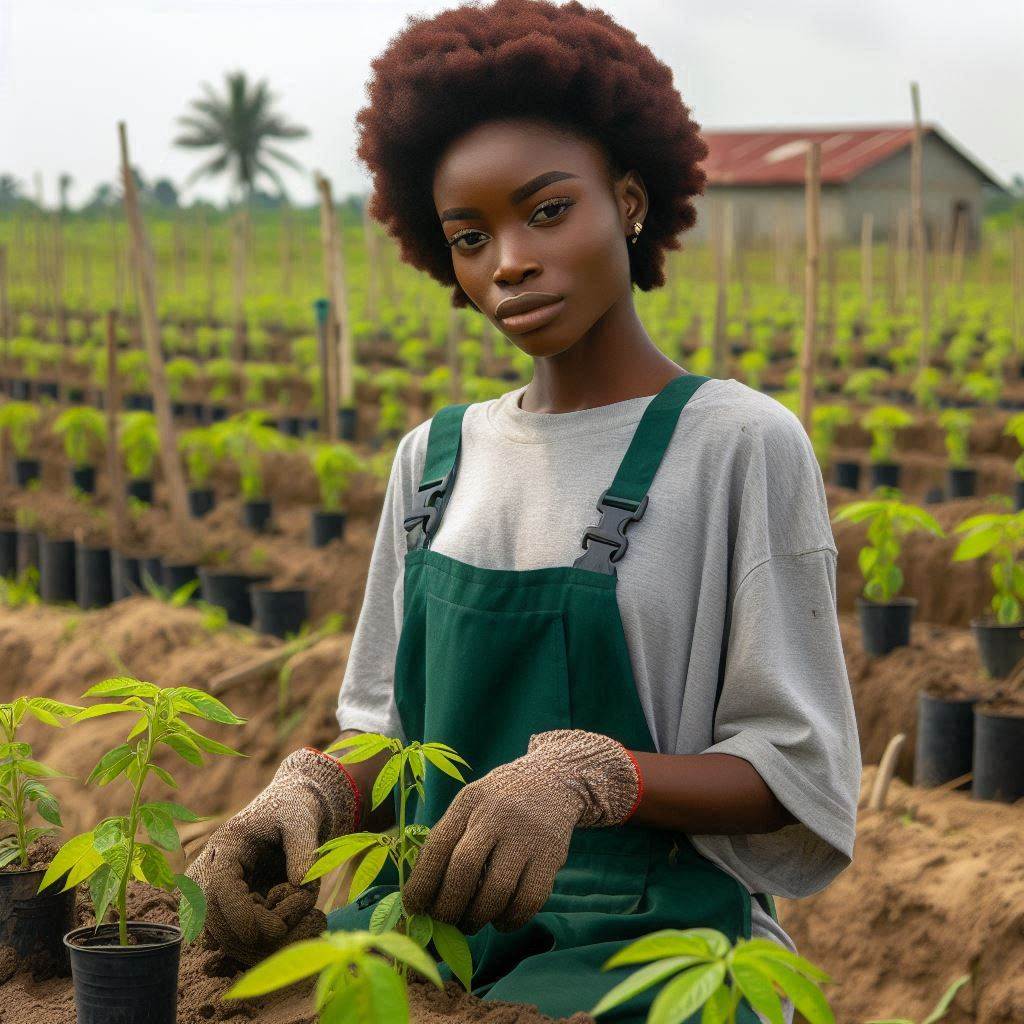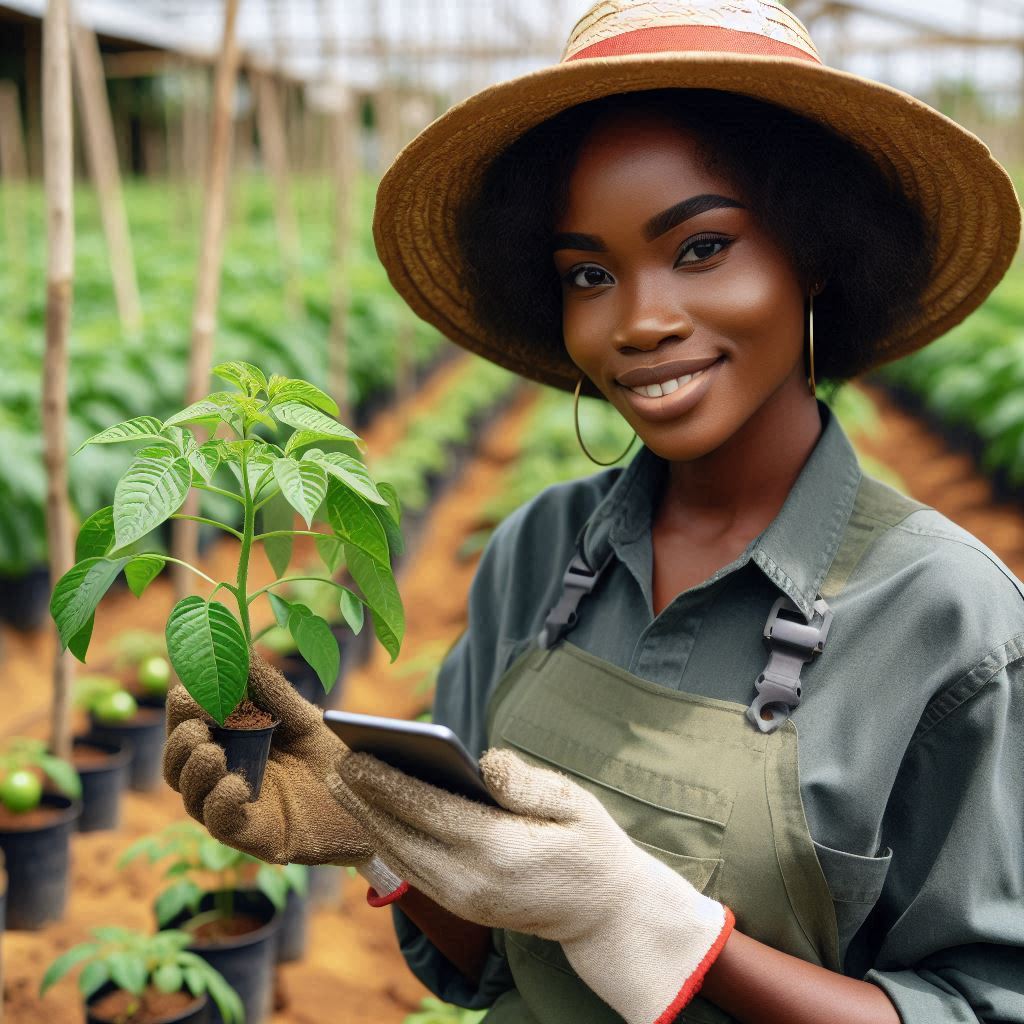Introduction
Plant breeding and seed science in Nigeria are at a crucial stage of development. The current state of these disciplines shows promising growth potential.
These disciplines are crucial for agriculture and food security in Nigeria. Improved crop varieties and quality seeds are essential for increased yields.
With a growing population and limited arable land, the need for advanced plant breeding techniques and quality seeds is more pressing than ever.
Plant breeding helps develop crops with desirable traits such as disease resistance, high yield, and nutritional value.
Seed science ensures the production of high-quality seeds that are vital for sustainable agriculture and food production.
Investment in plant breeding and seed science will contribute to increasing crop productivity, improving farmers’ livelihoods, and ensuring food security in Nigeria.
The government and private sector need to collaborate to enhance research, training, and infrastructure in these disciplines.
Capacity building and technology transfer will play a crucial role in advancing plant breeding and seed science in Nigeria.
Basically, the future of plant breeding and seed science in Nigeria is bright, with the potential to revolutionize agriculture and ensure food security.
Historical perspective
Plant breeding and seed science have played a crucial role in shaping Nigeria’s agricultural landscape over the years. From traditional methods to modern techniques, the evolution of these practices has been significant.
Evolution of plant breeding and seed science in Nigeria
In Nigeria, plant breeding and seed science have evolved from simple selection and propagation methods to sophisticated biotechnological approaches. The introduction of hybrid varieties and genetic engineering has revolutionized the field.
Major milestones and achievements in the field
Several milestones have been achieved in plant breeding and seed science in Nigeria. The development of high-yielding crop varieties, resistant to pests and diseases, has significantly increased agricultural productivity.
The establishment of research institutions and seed companies has also contributed to the advancement of the field.
Challenges faced in the past
Despite significant achievements, plant breeding and seed science in Nigeria have faced numerous challenges in the past.
Limited funding for research and development, inadequate infrastructure, and a lack of skilled personnel have hindered progress in the field.
Additionally, the unavailability of quality seeds and traditional farming practices have posed obstacles to enhancing crop yields.
Read: Scholarship and Funding Opportunities for Forestry Students in Nigeria
Current status
Overview of the current research and practices in plant breeding and seed science in Nigeria
Nigeria’s landscape in plant breeding and seed science is dynamic, witnessing a surge in research and innovative practices.
As the nation grapples with agricultural challenges, such as climate change, soil degradation, and food insecurity, there’s a growing emphasis on leveraging advanced breeding techniques and seed technologies.
Researchers and practitioners are exploring novel methods, including molecular breeding, marker-assisted selection, and genomic sequencing, to develop resilient crop varieties with enhanced traits.
Moreover, sustainable agricultural practices, such as organic farming and conservation agriculture, are gaining momentum, underscoring the importance of ecological balance and resource efficiency in plant breeding.
Key players and institutions involved in research and development
Numerous institutions and organizations are at the forefront of research and development efforts in plant breeding and seed science.
Government agencies like the National Agricultural Research Institutes (NARIs) play a pivotal role in conducting research, developing new varieties, and disseminating agricultural technologies to farmers.
Private seed companies and non-governmental organizations (NGOs) also contribute significantly to the sector, investing in breeding programs, seed production, and farmer training initiatives.
Collaborations between academia, industry, and government entities are fostering synergy and knowledge exchange, driving innovation and accelerating the adoption of improved crop varieties.
Success stories and innovative approaches in the field
Across Nigeria, there are notable success stories and innovative approaches that highlight the transformative potential of plant breeding and seed science.
For instance, initiatives like the Cassava Adding Value for Africa (CAVA II) project have revolutionized cassava breeding, resulting in high-yielding, disease-resistant varieties that benefit millions of smallholder farmers.
Similarly, the Water Efficient Maize for Africa (WEMA) project has introduced drought-tolerant maize hybrids, enhancing resilience and productivity in drought-prone regions.
Furthermore, farmer-participatory breeding programs empower local communities to co-create solutions tailored to their needs, promoting inclusive and sustainable agricultural development.
Therefore, the future of plant breeding and seed science in Nigeria is promising, driven by innovation, collaboration, and a commitment to addressing pressing agricultural challenges.
With continued investment, research, and adoption of best practices, the nation can achieve greater food security, economic growth, and environmental sustainability.
Read: Overview of Horticulture in Nigeria
Challenges and Limitations
One of the major challenges facing plant breeding and seed science in Nigeria is the inadequate funding and lack of infrastructure for research.
Without proper financial support and access to necessary resources, researchers find it difficult to conduct meaningful experiments and develop new varieties of crops.
Another limitation is the limited adoption of modern breeding techniques. Traditional methods have been predominant in Nigerian agriculture, and there is a reluctance to embrace more advanced technologies.
This hinders progress in developing high-yielding and disease-resistant crop varieties that could address food security challenges.
Furthermore, there are threats to biodiversity and genetic resources in Nigeria. Some native plant species are at risk of extinction due to habitat destruction, climate change, and lack of conservation efforts.
This loss of genetic diversity can have significant implications for future breeding programs and sustainable agriculture.
Lack of Funding and Infrastructure for Research
- Inadequate financial support for research activities
- Lack of modern laboratories and equipment for plant breeding
- Limited access to quality seeds for conducting experiments
- Insufficient government funding for agricultural research
Limited Adoption of Modern Breeding Techniques
- Lack of training and capacity building in new technologies
- Resistance to change among farmers and researchers
- Shortage of experts in advanced breeding methods
- Lack of collaboration with international research institutions
Threats to Biodiversity and Genetic Resources
- Habitat loss and deforestation impacting native plant species
- Climate change affecting the adaptation of crops to new conditions
- Lack of conservation programs for rare and endangered plants
- Illegal trade and exploitation of genetic resources
Ultimately, addressing these challenges and limitations is crucial for the future of plant breeding and seed science in Nigeria.
By investing in research, promoting the adoption of modern techniques, and conserving biodiversity, the country can enhance agricultural productivity, ensure food security, and contribute to sustainable development.
Read: Horticultural Tools and Equipment in Nigeria

Uncover the Details: Challenges Facing Wildlife Management in Nigeria
Opportunities for growth
Nigeria has vast opportunities for growth in plant breeding and seed science due to its diverse agro-climatic zones.
The rich biodiversity in the country provides a wide array of plant species to explore and develop into better cultivars.
With a growing population and increasing demand for food security, there is a need for improved crop varieties.
This demand presents an opportunity for plant breeders to develop high-yielding, disease-resistant, and climate-resilient crops.
Potential for collaboration with international partners and institutions
Nigeria can benefit greatly from collaborating with international partners and institutions in plant breeding and seed science.
Partnerships can provide access to advanced technologies, expertise, and funding for research and development projects.
Transform Your Career with Expert Guidance
Get personalized mentorship consulting that’s tailored to your unique path. Our expert advice is actionable and exclusive.
Get StartedCollaboration with renowned institutions can also enhance capacity building and knowledge transfer in the field.
These partnerships can help accelerate the pace of innovation and increase the competitiveness of Nigerian plant breeding programs.
Government policies and initiatives to support plant breeding and seed science
The Nigerian government has started implementing policies and initiatives to support plant breeding and seed science in the country.
Initiatives such as the National Agricultural Seeds Council Act aim to regulate the quality of seeds in the market.
The government also provides support through research grants, extension services, and infrastructure development in the agricultural sector.
These policies create a conducive environment for researchers, breeders, and seed producers to thrive in Nigeria.
Emerging technologies and tools that could revolutionize the field
New technologies such as marker-assisted breeding, gene editing, and bioinformatics have the potential to revolutionize plant breeding in Nigeria.
These tools can help breeders develop tailor-made crops with desired traits in a more efficient and precise manner.
Digital tools and data analytics can also optimize breeding programs, leading to faster development of improved varieties.
Adoption of these emerging technologies can significantly enhance the effectiveness and impact of plant breeding and seed science in Nigeria.
Read: Hydroponics in Nigerian Horticulture
Future prospects
- Vision for the future of plant breeding and seed science in Nigeria
- Role of these disciplines in achieving sustainable agriculture and food security goals
- Potential impact on the economy and livelihoods of farmers
Vision for the Future of Plant Breeding and Seed Science in Nigeria
Plant breeding and seed science in Nigeria hold immense potential for transforming the country’s agricultural sector. As we look to the future, it is essential to have a clear vision of where we want these disciplines to take us.
Role of These Disciplines in Achieving Sustainable Agriculture and Food Security Goals
Plant breeding and seed science play a crucial role in achieving sustainable agriculture and food security goals in Nigeria.
By developing high-yielding, disease-resistant crop varieties, these disciplines can help increase food production and ensure stable food supply for the growing population.
Furthermore, plant breeding and seed science can contribute to sustainable agriculture by promoting biodiversity and conserving genetic resources.
By developing crop varieties that are well-suited to local agro-ecological conditions, these disciplines can reduce the need for chemical inputs and help mitigate the effects of climate change on agriculture.
Potential Impact on the Economy and Livelihoods of Farmers
The advancement of plant breeding and seed science in Nigeria has the potential to have a significant impact on the economy and livelihoods of farmers.
By increasing crop yields and improving crop quality, these disciplines can enhance farmers’ incomes and contribute to poverty reduction.
Moreover, by providing farmers with access to high-quality seeds, plant breeding and seed science can enhance the resilience of farming systems and help farmers adapt to changing environmental conditions.
This, in turn, can improve food security and contribute to overall economic development in the country.
In review, the future of plant breeding and seed science in Nigeria looks promising.
With a clear vision, a focus on sustainability, and a commitment to supporting farmers, these disciplines can play a key role in transforming the country’s agricultural sector and contributing to the achievement of sustainable development goals.
You Might Also Like: Field Trials and Their Importance in Plant Breeding
Conclusion
In closing, the future of plant breeding and seed science in Nigeria holds great promise for the agricultural sector. With advancements in technology and research, the country has the potential to become a leader in this field.
Recap of key points discussed in the post
We have highlighted the importance of investing in plant breeding and seed science to increase crop yields, improve food security, and enhance the overall agricultural productivity in Nigeria.
Call to action for stakeholders to invest in the future of plant breeding and seed science in Nigeria
We urge government agencies, research institutions, private companies, and other stakeholders to allocate resources and support initiatives that will drive innovation in plant breeding and seed science.
By collaborating and investing in this crucial area, we can transform the agricultural landscape of Nigeria.
Hope for a bright and prosperous future for agriculture in the country
With a concerted effort to prioritize plant breeding and seed science, Nigeria can achieve sustainable agricultural development, create employment opportunities, and ensure food self-sufficiency for its growing population.
Let us work together towards a thriving future for agriculture in Nigeria.




